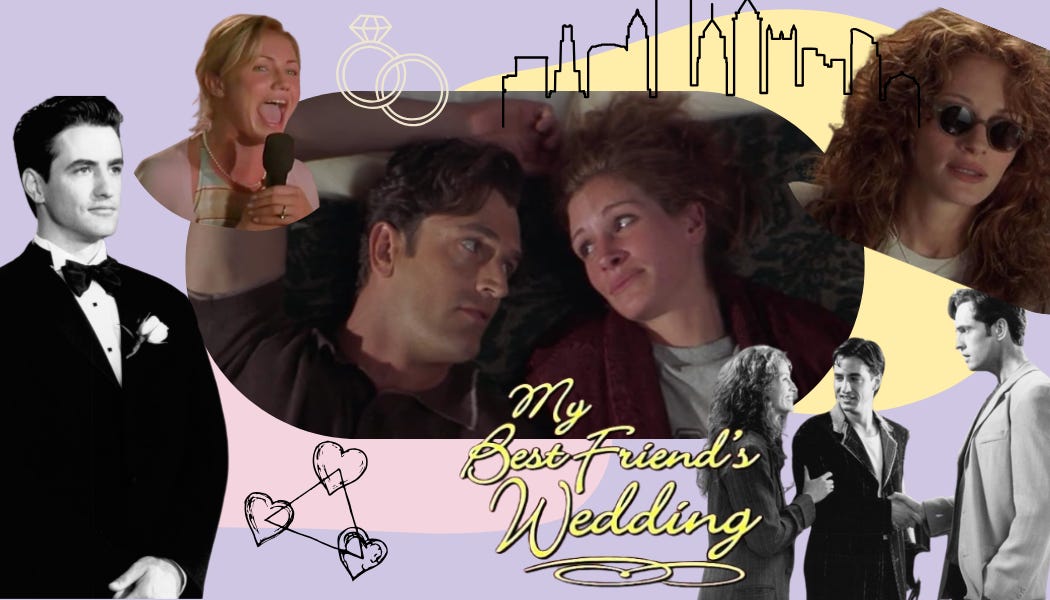34 thoughts while watching 'My Best Friend’s Wedding' from an off-duty therapist
George, not Michael, but not to be confused with George Michael.
This is a segment, dialoguing on dialogue, where I briskly explore a piece of media–TV, movies or music—with first thoughts. Inspired by Emma Specter’s column for Vogue where she narrates her thoughts as she watches a movie, movie trailer, or gets a first look of an upcoming movie. This is my take on that, weaving my personal reflections together with any therapeutic concepts I stumble upon along the way. I am not teasing out every single concept—I’m off the clock. This is a creative, not clinical, endeavor.
One thing before we jump in, I show up very much as myself here. Myself first, and all my other labels are secondary. If a therapist speaking candidly feels like too much to your system, that is absolutely is OK and this may not be the best particular newsletter for you.
The official tagline for the 1997 classic My Best Friend’s Wedding reads, “Julianne fell in love with her best friend the day he decided to marry someone else.”
Gawwwwwd, that’s good. I love a good premise. I wish I was above it, but I just am a slut for a good premise.
The more I do this series the more I contend with how much of my early education about emotions, identity, relationships and humanity was delivered primarily through a screen. We can debate the health of that for another time, but the truth is my understanding of people’s insides–emotions, thoughts, motives, narratives–did not come from the people in my life. Vulnerability IRL wasn’t as ubiquitous in the 90’s and early aughts as it is today.
This film drips with the aspects of movies I nerd out over. The dialogue and feelings, of course. But also, the cinematography. The locations. The music. Actors playing. It’s got it all.
CAST
Julianne Potter played by Julia Roberts
Michael O’Neal played by Dermot Mulroney
Kimberly Wallace played by Cameron Diaz
George Downes played by Rupert Everett
Every summer, my mother, sister, niece and I try to go on a trip somewhere in the US. It’s usually one part touristy shit, one part playing cards, and one part watching nostalgic films. Last year it was Something's Gotta Give and The Bodyguard (a double feature FOR.THE.AGES). I realize this is potentially an annoyingly earnest quality, but I get SO excited to show my niece these films I grew up loving and watching on repeat.
A few summers ago, the selected film was MBFW. It’s only when I had my niece—wise beyond her twenty years—next to me that the nefarious nature of this movie started to sink in.
She turned to us, “You know this is pretty messed up, right?”
I regret to inform you that we, in fact, did not. Julia’s red curls and charisma had distracted us from the fact that she’s very much the anti-hero.
Maybe this has always been obvious to you, but not to me. The truth is every other time I’ve watched this film, I’ve been on “her side,” wanting Michael to “pick” her. Listen, all of the language I just put in quotes is not good. It does however provide some context for the messaging I subconsciously took into most of my relationships.
Let’s begin the unpacking, shall we?
I totally forgot about this opening number. Ani DiFranco’s cover of “Wishin’ and Hopin.’”
“All you gotta do is hold him, and kiss him and love him
And show him that you careShow him that you care just for him
Do the things he likes to do
Wear your hair just for him, 'cause
You won't get him
Thinkin' and a-prayin', wishin' and a-hopin'"Is this satire? I really can’t tell. I can tell you as a young impressionable child watching this, I didn’t bat an eye. Tell me this is satire. Tell me.
Keep reading with a 7-day free trial
Subscribe to dialoguing to keep reading this post and get 7 days of free access to the full post archives.




